
“With his dark locks and swarthy cheeks smudged with dirt, the good folks took him for some gipsy boy.”
Title: Honor Bright: A Story of the Days of King Charles
Author: Mary C. Rowsell
Release date: February 23, 2021 [eBook #64615]
Most recently updated: October 18, 2024
Language: English
Credits: Susan Skinner and the Online Distributed Proofreading Team at https://www.pgdp.net (This file was produced from images generously made available by The Internet Archive)

“With his dark locks and swarthy cheeks smudged with dirt, the good folks took him for some gipsy boy.”
Honor Bright
A STORY OF THE DAYS OF KING CHARLES
BY
MARY C. ROWSELL
WITH TWENTY-THREE ILLUSTRATIONS
PHILADELPHIA
HENRY ALTEMUS COMPANY
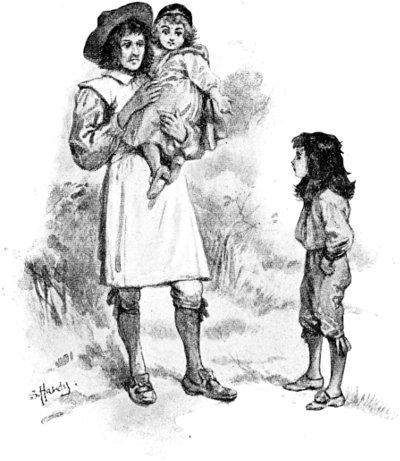
Copyright, 1900, by HENRY ALTEMUS COMPANY.
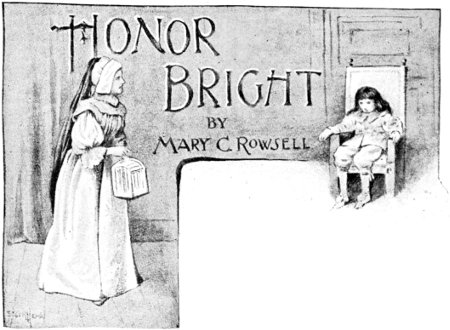
One fine autumn morning a long time ago, a little boy lay stretched in the broad seat of a latticed window, gazing earnestly with his great dark eyes on the scene before him. The window was the only one in the room, which was situated high up in a sort of tower at the corner of a big old house.
The beautiful garden surrounding the house was laid out in long terrace walks, with wide stone steps and balustrades, and planted with smooth-shaven yew-hedges as thick and almost as sturdy as walls, and the flower-beds carpeting the ground were ablaze with glorious colors in the shadowless sunshine, for the great bell in its wooden cote above the square red-brick gate-house was ringing out midday. Bounding the garden on every side were lofty walls, covered with the spreading branches of plum and pear and apple trees, and the rich fruit gleamed red and tawny and purple, bright as gems among the green leaves. Away beyond the garden, far as eye could reach, stretched wood and dale and fair green meadows, where the sheep cropped at the sweet turf and the cows{6} grazed, whisking away the tiresome flies with their great tails as they moved slowly along. Here and there among the leafy hedgerows and coppices, the little boy, whose Christian name was Charles, could see from his lofty watch-place the gleaming of a stream which wound like a silver ribbon on and on, nearer and nearer, till it reached the little wood covering the wide, sloping banks which shut in the road leading past the house. There for some distance it was almost completely lost in the ferny brushwood, peeping out again at last in a rush-grown pool. Thence hurrying onward, it wound right round the walls of the house, so that to reach the great nail-studded main door you had to cross a little one-arched stone bridge.
Faster and faster, as he gazed upon this fair scene, the tears brimmed up into the little lad’s eyes, until they rolled down his cheeks—cheeks not very rosy or chubby, like those of most boys and girls of eight or nine years old, which was the age of this boy, but of a clear, naturally healthful brown, although just now they looked a little wan. His hair was also dark, and fell in thick curly locks upon the broad collar of Flemish lace covering his shoulders to the top of the sleeves of his dark-green velvet surcoat. His face was rather handsome, and, although there was an expression of self-will about his lips, it was mingled with great good-humor, as if he had a kind, generous nature, and might look merry enough when there was anything to be merry about.
That, however, he at present considered as being very far from the case; and at last his silent weeping broke out into loud sobs, which grew only the louder the more he strove to stifle them. They could be heard such a long way off that they reached the ears of Lady Chauncy, the mistress of the house, who was sitting at her needlework in her private room on the floor below. She rose with a little impatient frown at being thus disturbed, and taking from a side-table a small gilt cage, which contained a fine blackbird or merle, as blackbirds were then called, and carrying it with her, went up the stairs to the room where the boy was.
First removing a stout wooden bar from across the door, she lifted a bunch of big keys, hanging from her girdle, and, selecting one of the keys, put it in the lock of the door, turned it, and entered the room.
“What is the matter?” she said, as she carefully locked the door behind her, and advanced a few steps into the room. She was an oldish lady, with a yellowish wrinkled face framed tightly in with a cap of fine linen in such a fashion that, if she had any hair, none of it was to be seen. Her eyes were light green-gray, and gleamed sternly, but not unkindly, under their thick grizzled brows upon the boy, as at sight of her he slid down from his corner, and went and sat in a large high-backed armchair. He brushed away the tears from his eyes, but he made no answer, and the lady had to repeat her question.
“What are you crying about? Are you ill?” she went on. “Have you a headache, or a toothache—or any ache?”
“No, madam, not the merest finger-ache,” replied the little lad, with almost a smile. “There is nothing—nothing at all amiss with me,” and then, in spite of his grand words, a last lingering sob broke up his speech. “I am only—only——”
“Only hungry—is that it?” she said, with a relieved look. “Well, eating is the best cure for that, and your favorite dinner will be here directly——roast beef; so dry your eyes.”
The boy’s face did not, however, grow much brighter, and Lady Chauncy began to knit her stern brow again. “Come, come, your Highness is hard to please to-day,” she went on; “what is amiss with you to be so naughty and discontented? Pray what can you lack? Where are your draughts, and your beautiful new horn-book, and your brave new troop-horse which his Majesty brought all the way from Cheapside in his own coach for you? You ought to be happy as the day is long, with everything dainty and to your taste to eat, and a soft bed, and the blue sky and the fair scene to look at from this casement. What, tears again?” for at these last words of Lady Chauncy’s the boy’s breath quivered very much as if the sobs were going to burst out afresh. “Nay,”{8} she went on, “I’ll warrant they will dry up fast enough when you see what I have here for you,” and, pulling off the cover of the gilt cage, she placed it on the table. “William the gardener caught this pretty bird to-day, and I have put it in this fine cage and bring it you for a present. What do you say?”
The boy did not reply. He only looked hard at the captive bird, and still the tears seemed swelling in his throat. “It is a brave bird,” he said softly at last.
“Well, I am glad you are pleased with it,” said Lady Chauncy, “but I must be going now—and hark,” for at this moment there came a loud tap at the door, “there is Wynkin come with your dinner,” and she turned and unlocked the door for a serving-man who entered with a silver tray laden with plates and dishes, and, entrusting him with the key of the door, she went out, closing it carefully behind her.
Meanwhile the servant spread the snowy damask cloth on the carved oak table and arranged the dishes, and having helped the boy from the joint of roast beef, and poured out a goblet full of clear golden cider from a silver flagon, he took up a place behind Charles’s tall-backed chair, looking in a concerned, half-scared sort of manner at the boy when, after a few mouthfuls, he pushed aside the plate.
“Take it away,” he said.
“But your Highness has hardly eaten anything,” said Wynkin.
“No,” said Charles, “I can’t eat any more in this stifling cupboard of a place. Could you now, Wynkin?”
Wynkin grinned. “I think I could,” he said, “if——”
“If what?”
“Well, if it was roast beef.”
“Don’t you have roast beef for dinner of a day?”
“Only on Sundays, your Highness. Week-days we have mostly porridge for dinner, or, for a treat now and again, a sop in the pan of barley-bread.”
“And what do you have for pudding?” inquired the Prince, as Wynkin removed the thrust-aside plate and placed a dish of{10} quince tarts on the table all heaped up with whisked cream stuck over with sugar-plums; “sweets, you know.”
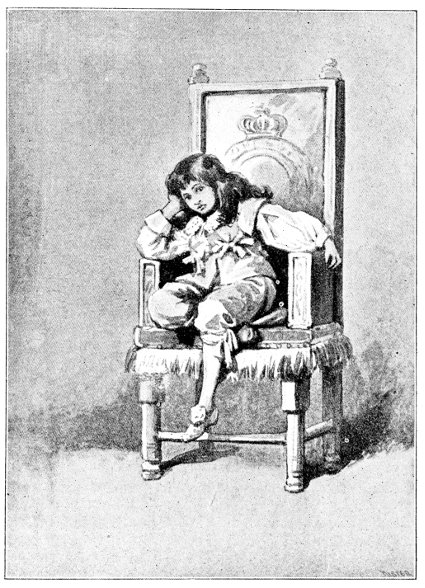
“At the sight of her he slid down from his corner and went and sat in a large high arm-chair.”
“Oh, we don’t have them at all, except at Christmas, which comes but once a year, worse luck. A little sour buttermilk sometimes perhaps, but sweet things, bless your heart, no.”
“Oh, yes, you do,” said Charles, with a merry twinkle in his eye; “you have the sweetest thing of all—liberty.”
“Why, yes, that is true,” admitted Wynkin, gazing down sorrowfully at the boy.
“And I wish I were you, Wynkin,” went on Charles, all the clouds darkening his face again. “It’s dreadful to be a King’s son, I can tell you; and treated as if I’d done something wrong, and I haven’t—I haven’t.”
“No, of course not,” said Wynkin, in consoling tones. “It isn’t possible, for the King can do no wrong, I’ve always heard say. Every idiot knows that, and it isn’t likely his son can, particularly his eldest son, the Prince of Wales, like you are.”
“I never thought of that,” said Charles, with a meditative air, as he lifted all the whipped cream with his spoon from his tart and swallowed it at a gulp. “I may do whatever I please and it won’t be wrong. But there, that’s just it—I can’t do what I please. How can I? I want to run and jump and bathe out in that splendid pool there, and climb up those great tall fellows of trees and—and—do all the things other boys do—for I’m not a baby now—I’m turned nine—and it’s a shame, keeping me cooped up in this mousetrap of a room. Oh, you know it is, Wynkin, and you might say so, if you had a kind heart, but you haven’t—you are hard-hearted and cruel, like the lords.”
“But they have to be cruel to be kind,” contended Wynkin. “The King’s Majesty, God preserve him, has so many enemies—so many who hate him.”
“Yes, I know, so ’tis said,” replied the boy, “and ’tis all very well, Wynkin, but I can’t believe it. My father is so gentle and kind. If ’tis true, ’tis because they don’t know him.”
“That may be so, your Highness. And ’tis just the business{11} of many of those who call themselves his Majesty’s friends to hinder him from being known as—as you know him. And you see, there are bad men about of all sorts and sizes and parties, who want to get you away from him.”
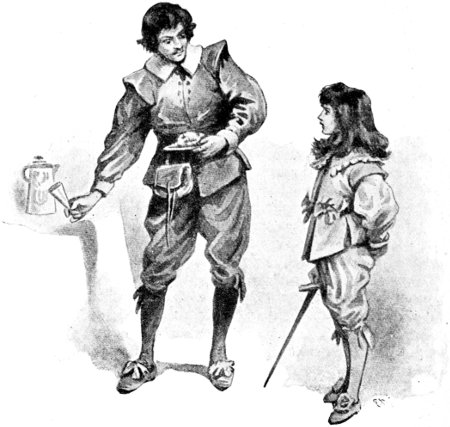
“I’d be torn in pieces first,” said the child, his dark face flushing.
“Yes,” said Wynkin, “that’s about what it would be. I’m not certain but I think now there’s a price set upon your head.”
“What’s the good of it to anybody?” laughed Charles.
“Oh, well, there mayn’t, of course, be anything in it?”
“Inside my head?” laughed Charles still more merrily.
“In the talk, your Highness.”
“That is as it may be,” said Charles, “but there is more than one idea inside my head, and the biggest is that I’m not afraid of these evil persons; and the next is that if I can only get out of this badger-hole of a room, I’ll let them know I’m not—and I’ll protect my father from—where is my father just now, Wynkin?”
“He was in London a few days since.”
“Is mother with him?”
“Nay, I think she has gone to France, to fetch soldiers to come over and fight for the royal cause.”
“Oh, that is all right, and when they come—now, Wynkin, look here—I intend to go to my father and fight by his side. Oh, I tell you I can—see,” and, seizing his little wooden toy sword, he tipped his left fingers over his head and thrust out the weapon with such a valiant air that Wynkin laughed heartily and said he had never seen a finer copper captain.
“Nay, copper captain forsooth,” said Charles, flinging away the sword, and seizing the long white stick which Wynkin carried as his staff of office when waiting on the Prince. “I’ll show you I’m no copper captain,” and he began to lunge about with it so lustily that at last he gave Wynkin a sharp poke in the eye. “Oh, dear,” cried the boy, throwing down the stick; and, springing into the serving-man’s arms, he clung round his neck and stroked his damaged eye. “I’m so sorry, Wynkin. It doesn’t hurt much, does it—though it is going all red and black?”
“Nothing to talk about,” said Wynkin, “but you can cut and thrust with the best of ’em. Feeling’s believing.”
“Yes,” said Charles proudly.
“A regular don at it you are,” went on Wynkin, as he began to pile the dinner things together for taking away, “but I must be going now.”
“Oh, don’t go,” pleaded the lonely boy.
“Needs must. I’ve got to be going up-stream with some corn sacks, and the last harvest load’s being carried to-day, and all hands are turned on.”
“Except mine,” sighed the Prince, gazing down sadly at his little slender white hands. “It’s hateful. Now, Wynkin,” he went on, turning suddenly with a commanding air upon the serving-man, “listen to me. Give me that key immediately,” and he pointed to the key which Lady Chauncy had entrusted to Wynkin, and which the man had thrust into the breast of his jerkin in such a manner that the handle peeped out. “I want it.”
“Oh, do you?” said Wynkin, most respectfully.
“Yes, and you must give it me immediately.”
“Faith, not I, your Highness. You’ll be trying to unlock the door with it the next thing,” grinned Wynkin.
“Certainly,” replied Charles majestically. “That is the purpose for which I require it.”
Wynkin’s broad smile grew broader than ever. “What next, I should like to know,” said he.
“That is a matter that does not concern you,” replied the Prince; “your manner is very disloyal. If you must know, I want to get out.”
“Which is precisely what his Majesty has forbidden my lord and my lady to allow you to do,” rejoined Wynkin, “and they have given him their word of honor and solemn promise that you shall not get out, and it’s because I have always been trusted by my lord and my lady to abide by my word, and have never broken faith to them, that they allow me to wait upon your Highness,” and Wynkin took a long breath, for he was not used to making such lengthy speeches. “Honor bright, you know,” concluded he.
The young Prince made no reply. For a long time he stood looking Wynkin full in the face with thoughtful-looking eyes, and Wynkin returned the gaze, but whether his damaged eye hurt him, or somehow a tearful choking kind of feeling in his throat troubled him, it is certain that he turned away, and hurriedly gathering the dinner things together on his tray, he went out, carefully locking and barring up the door behind him.
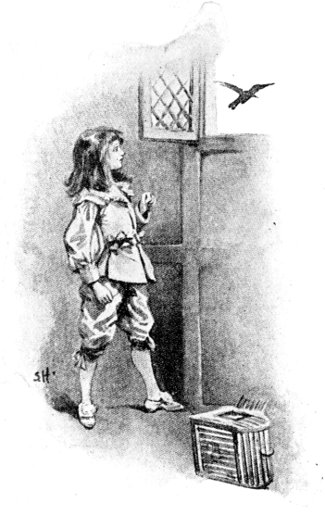
Charles stood listening to Wynkin’s departing footsteps down the oaken staircase till the last echo of them died out. Even then perhaps he would not have stirred, had it not been for the merle, who suddenly piped a plaintive note or two in his cage, which Wynkin had hung upon a handy nail near the window.
“Ah,” cried Charles, turning quickly to the bird, “I forgot all about you.”
The merle looked at him with his bright eyes, in which there seemed to the boy to be a sorrowful pleading expression.
“What is the matter, birdie, old fellow?” said Charles. “Are you hungry? No; they would never have neglected to give you seed and water, I am sure.”
And there, as he looked to ascertain, he found not only seed and water to the very brim of the pannikins, but also, stuck between the bars, a big piece of watercress, while at the bottom of the cage was a large worm wriggling about. Nothing, in fact, was wanting to the convenience and content of the tenant of the cage—in the way, that is, of creature comforts—but his wings drooped forlornly, and he looked very unhappy, nevertheless.
“Ah,” said the Prince, as he clambered on to the high window-seat, and took down the cage, “I like you very much, you dear little fellow; and I should like to keep you, for I am very lonely, and you are most sweet company, and it is a very fine cage, isn’t it? But you are breaking your merry heart in it, I am positive you are, and you shall get out. Her ladyship may not approve; she may even whip me for it, though I believe she mustn’t do that, much as her fingers often itch for it, but I’m going to let you go,” and so saying, he unfastened the door of the cage, and set the entrance against the open lattice. “There, go,” he went on, as for an instant the bird perked his shiny head on one side, as if he was listening intently to all Charles was saying to him, “fly away, dear bird, and joy go with you, for outside you will find it again.”
And then with a flap of his wings, away flew the merle, straight across the moat into mid-air, till he reached the bough of a high elm not far off. There he settled, and opening his yellow beak, he set up such a joyous song as never was heard—anyway, inside a cage.
“I expect,” said Charles, looking into the cage again, and poking the watercress stalk under the body of the worm, “that you would rather wriggle down there among the flowers than in that miserable sprinkling of sand,” and with that he flung the worm far across the moat on to the grassy bank below. “Of course, if Master Merle catches you again, you must settle the matter between you, and it is certain he will be picking up an appetite again now, and it will be ‘catch as catch can.’”
Then, putting the toe of his little silver-and-blue rosetted shoes to the cage, he sent it flying to the other side of the room. That done, he dropped wearily down again in the great tall velvet chair, and lolled back, a very picture of misery and discontent.
“Who’d imagine,” he muttered to himself, “that it was such a horrid thing to be a Prince? I wonder if all Princes are so wretched, or whether it is only Princes of Wales, like me?” Then he yawned and lay with his eyes wandering listlessly round the room, watching the rays of the afternoon sun as they poured in{16} at the lattice. The air felt stifling, for it was a small room, considering, that is, that the house was such a large one; but great mansions in those golden days, when Charles the First was King, contained rooms of all sizes as well as all shapes. Rooms were not merely four square walls, as mostly they are now, but built as it might be into all sorts of passages and corridors and staircase landings, now with a step or two up, now with a step or two down. One reason for this was that, as time went on, the owners of these big houses would add on a piece here, a wing there, and the level of the old floors and the new floors would not always exactly lie together, but it made the houses much more amusing and snug to live in.
Such a queer hole-and-corner chamber was the old Cedar Room, as it was called, in which little Charles Stuart, King Charles the First’s eldest son, had been shut up for three weeks past. The King himself, with his Court, had been in London, but the Roundheads, who were the King’s discontented subjects, and the Royalists, who were faithful to him, were glowing into a red heat of rage with each other. It was no longer safe for the little boy to be in London, and so the King had entrusted him to the care of one of his most devoted friends and counselors, who took him away at dead of night from London to his home in Warwickshire, and nobody—not even the other Royalists—was certain where the child was. Many thought that he had been carried across the sea to France. It was not of much use telling the boy that he had been taken away from his father and mother for his good. The poor little lad was not old enough to understand how this could be, and so he was very unhappy, and he detested with all his might that old Cedar Room, and all that was in it, though it was considered a vastly fine room, and a very curious one. That, indeed, was one reason why Lady Chauncy, who, for all her prim manner, was a most kind, motherly person, had persuaded her husband to lodge the young Prince in it, “for besides being so high up and remote,” said she, “the mannikins will be huge and endless amusement for him, and make the time pass{18} more quickly till there is an end to all this pother, and the child can get about again.”
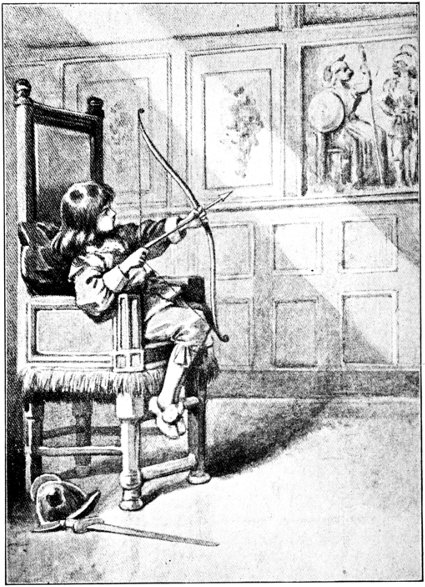
“When that sun-ray tips it with red, I’ll see if I can’t hit it. I’ve hit a better mark before now.”
Now, the mannikins, as her ladyship called them, were the little figures carved on the panels of the walls all around the Cedar Room, which was of a rather lop-sided shape, neither square nor oblong, but a little of all three fitted into the uppermost part of an angle of the mansion which jutted far over the moat. These panels were very old, at least two hundred years, and the room was as ancient, but its walls were as stout and sturdy as on the day they were made. The panels were of Flemish carving, and they represented the gods and goddesses of heathen mythology. There was Jupiter hurling lightning from his throne, Juno with her peacocks, Vulcan hammering away on his anvil, and Minerva sitting up very majestically in her helmet and coat of mail, holding her shield. The faces, however, of these far-famed personages were far from being like what Charles had always imagined of them when his father had related tales about them to him, as often he had done. According to this description of them, which sometimes the King would read out loud to him from the poetry-history of Homer, they were beautiful, even glorious, to look upon, but these mannikins were as ugly and clumsy almost as if they were made of gilt gingerbread. They were pretty well as broad as they were long, dressed in jerkins, or muffled in cloaks and full skirts, and their faces were almost all nose, that is to say, where they had any at all, for many of the noses had stuck out so far that they had got chipped off or worn flat. Why the carver of all these gentry had made such a point of their noses puzzled Charles, who for the first few days of his living in the Cedar Room was certainly immensely amused with this silent, droll company; but after a while he got cross with their dull faces.
“If they were real,” he said one day to Wynkin, “what blockheads they would be!”
“And blockheads they are now,” had been Wynkin’s reply.
And if there was one of the wooden folk Charles found more irritating than another, it was Madam Minerva. She sat up so prim and cross-looking and her nose poking out from under her{19} helmet, bigger even than that of great Jove himself; or so it seemed to Charles, as he lay listlessly watching the afternoon sun-rays pouring in at the lattice, and listening half glad, half sad to the piping of the happy merle in the elm-tree, and the voices of the harvesters far down below in the fields.
How he longed to be with them and watch the loading of those last sheaves into the big carts, and how stiflingly hot the Cedar Room was, and how particularly forbidding and disagreeable goddess Minerva there looked, and how uncomfortable and heavy must be that scale armor of hers, and that shield, and the helmet, not to speak of such a nose. Ah! And, stretching out his hand over the arm of the chair, Charles picked up his toy bow, which lay with his own gilt pasteboard cuirass and tin helmet and wooden broadsword and other weapons on the floor, and setting the bow with a bolt, he sat waiting. “Yes,” he murmured, with a wag of his head, and setting his lips tight, “I won’t put up with her any longer, her and her nose. And when that sun-ray tips it with red, as in a minute or two it will, I—I’ll see if I can’t hit it. I’ve hit a better mark before now.” Then he waited and watched, and the crimson gleams crept on and on across the carved panels, and—whizz! went the string, snapping right back across Charles’s own nose so sharply that it stung him and he shut his eyes for a minute. When he opened them he beheld a strange and most unexpected sight.

The panel was turning round! slowly, but most surely turning round, much in the way that a turnstile moves, as if on a pivot or pin running from top to bottom of the wood.
Charles could hardly believe his eyes, which, indeed, after that stinger from the bowstring, were for a minute or two not so trustworthy as usual. He very soon, however, saw clearly enough that the panel really was open, and now stood half-way inside the room, half-way outside in the shadowy space beyond.
So amazed was he that for a short time he could not stir hand or foot, and only stood staring at the panel. But if he had never seen such a thing before, it was no great marvel, for not many people had done so. He had not only heard of, but seen, panels that lifted above into the walls, window-sash fashion, and panels that slid back sideways into grooves, and in the hope that such panels might be found in that room, he had spent hours in pushing and shoving and poking about the edges and frameworks of the carvings till his little fingers ached again. Then a hundred times he had cried, “Open, Sesame!” as Ali Baba did, but nothing had come of it. Yet now, here, in the most unexpected manner it had happened, and accordingly, like people in general, big or little, when on those rare occasions that which their heart most longs for comes to pass, he stood as if he was dazed and unable to believe it true. He soon, however, found his wits again, and slipping down from the chair, he crossed the floor and peeped into the dark space, though gingerly enough, lest the panel should think proper to snap to, and treat his nose as badly as he had treated poor Minerva’s.
Then he carefully examined the condition of that good lady, and found her to be not at all herself as he had hitherto had the{21} pleasure of her acquaintance. To be sure she sat bolt upright as ever, as far as her shoulders, but her head hung down now all dingle-dangle. Was her neck broken? No; it was not as bad as that, it was dislocated, and hung wobbling by a sort of metal hinge to which there seemed some wires and a steel spring attached.
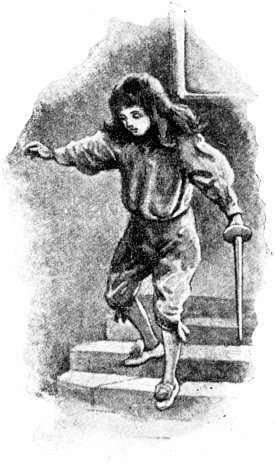
Well, certainly, thought Charles, as he looked, those Flemish craftsmen must have been very clever fellows. He did not however stop to think much about anything, for the belfry over his head began to sound with a terrific clangor as he stood in the opening. Five o’clock, and at five his supper was always brought him, and after that he had to go to bed. There was not a moment to lose, and, after a very brief consideration he stepped back into the room, and took off his doublet, putting it in a corner of the window-seat. Being such sultry weather all he wore under the doublet was the little shirt of fine cambric; then—but hark! voices! Why, bless your heart, yes, the merle’s voice, and the harvesters all rejoicing in the soft cool air which the waning day had brought. Quite a little breeze, in fact, as it came rustling and ruffling up from below to where Charles stood in the queer dark nook outside the panel; but his eyes were growing accustomed to the darkness now, and he could see that he was standing on the top of a staircase which wound down and down out of sight. There was one thing he had forgotten, in all his excitement, and a thing of the utmost importance too. His sword. He would not encumber himself with his armor or other weapons, but as a soldier and a{22} gentleman his short sword he must have; and he went back again and, picking it up from the floor, he stuck it into his belt, for he needed both hands free. Then slipping out once more upon the shelf of a landing, for it was no more, he drew the panel to. Had he been able to see then on its other side, he would have seen Minerva’s helmeted head pop up and settle itself all right and tight on her shoulders, as if nothing had happened, but by that time he was at the bottom of the staircase. It did not reach beyond a turn or two, and ended in a long always-downward-winding passage barely three feet wide and hardly higher.
Through this scudded Charles as well as he could, like a rabbit in a burrow, always down and down, and twisting and turning, guided by the glimmering of daylight which entered by little holes pierced at few-and-far-between distances in the thick stone wall on his left hand. Still on and on he went the downward way, till at last the air began to turn from cool to clammy, damp, and cold, and he stood still to listen, for there came a sound through the deadly silence. It was the trickling of water, and he guessed he must be close upon the moat.
The next moment he found his right hand was touching cold moss-covered stone instead of dry wood as hitherto. His heart fluttered like the wings of a bird, but he stepped on, feeling every inch of the way. In this manner he descended several stone steps that were slippery with ooze and felt jagged and crumbling under his feet. At the bottom of the steps he found himself standing on smooth and level ground, and, pausing to take breath, he listened again. The water was over his head, he could hear it gurgling slowly and solemnly on, and all round him was pitchy darkness, but far on straight ahead he saw, or fancied he saw, a gleam of reddish light.
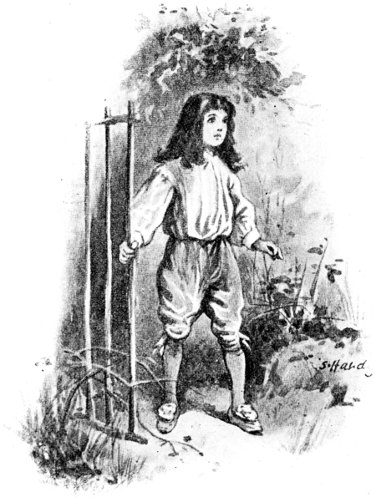
Plucking heart of grace, he moved on again, and soon the fancy became a certainty. It was the light of the sun now nearing the end of his course, and it was piercing the bars of a grating. From fluttering, Charles’s heart now stood still, for a great dismay seized him. What if that grating closed in the passage? Why, then, since{23} he had noticed that there was no handle or mark of any kind at the back of the panel in the Cedar Room, he would not be able to open it, even if he dared to go back, and so he would be caught like a rat in a trap! It wanted some courage to go on and make certain, and only after a second or two he found it, and, groping his{24} way on, reached the grating, to find that it was as he had thought so possible. The grating was just high and wide enough to allow of a person getting out of it. It stood on the top of a steep narrow flight of stone steps, and as Charles mounted these, the afternoon sunlight broke upon it from the outside, and he saw that it was chained and padlocked; but as he took hold of the padlock, it fell to pieces in his hand, all eaten through and through with rust. Then he saw that the links of the chain were equally useless, and as he gave the grating a push they all rattled and fell helplessly to the ground.
For a moment more the gate stuck hard, but with another tremendous push of Charles’s shoulder, it yielded with a screech, and swung back as far as a heap of mud and rotten leaves allowed it to go, and this was far enough to allow of Charles’s slender little body squeezing through.
When he got outside, he found himself—where? Ah! that was the puzzle of it. That he was beyond the moat of course he knew, but was he beyond the garden walls? If he was not—but he was, a good way beyond, right out in the fields; for though he was cooped up in a round sort of a bricked-in place like a well, and could see nothing but a close tangle of gorse and bramble overhead, he could hear the voices of the country folk, the neighing of horses, and the creaking of wagon-wheels hard by. And all at once as he listened the voices broke out in a loud cheery chorus. “Harvest Home,” sang the men, women, and children, while dogs barked, and the birds sang louder than ever:—
And Charles knew that he was free.
As the wagon-wheels creaked nearer and nearer, and the singing of the merry-makers came past him, Charles had all the work in the world to keep himself from leaping up out of the hole to join them, they seemed so happy. He himself did not feel anything like so happy as he had expected. He could not have laughed in that light-hearted way as the children did, chasing each other in and out of the gorse-bushes so near the edge of the hole that he could have caught them by the ankles as they ran.
At last all had passed by, and the only sound to be heard was the distant rumbling of the heavy-laden wagon-wheels down the hilly lane, or could it be the roll of distant thunder? for as he peeped over the edges of the hole he saw that the sun was setting in a bank of nearly black clouds. When he thought, that he was quite safe from being seen he scrambled up to the top of the hole, and a strange sight he looked, for his velvet breeches and his shirt and his face and hands were all one grimy drab color with the cobwebby dust and dirt he had gone through. Really, if anybody had spied him, there would have been no small difficulty in recognizing the little Prince who always went so richly and tastefully attired. No one, however, saw him as, taking one sharp look round, he sped like a lapwing with bent head through the thick tall furze-bushes covering the waste ground to the edges of the thicket beyond. At the other side of the thicket ran the bright stream whose course he intended to follow, as he knew that some miles ahead it joined the river Thames.
There, at the bottom of the broad steep-sloping bank he soon reached, lay a largish boat tied by a rope to the stem of an elm-tree.{26} Charles’s heart leapt within him: that was just the thing he wanted. Surely some kind woodland fairy must have placed it there, as fairies do in story-books, for his convenience. The next minute his delight faded out: another glance showed that the craft was loaded rather heavily for its size with some wicker-baskets and a small cask and a sack which peeped out from beneath a big canvas covering, and of course to get in and row off, with all that cargo aboard, would make him like a thief, so the plan was impossible. While he was cogitating on this most difficult question he heard voices, and voices that he knew well, too. No less than those of Lady Chauncy and Wynkin, who seemed to be coming through the trees. Charles turned all gooseflesh with dismay. To make a run for it would, likely as not, land him right into her ladyship’s stiff brocade skirts. There was not a minute to think, and so he ran the other way down the bank faster than a rabbit, and hey presto! with one leap he was at the bottom of the boat, and, creeping under the canvas among the sacks.
Feeling as if his heart was really in his mouth, he listened to what the lady and her serving-man were saying, and her ladyship, who spoke first, seemed in one of her pleasantest humors.
“And so you are off, Wynkin,” said she; “well, the sooner the better perchance, for I believe there will be a storm before morning, and you have a long way to go, and your good father and mother are, I doubt not, wearying to give you a welcome. You must tell them that when his Highness hath been delivered safe back to his Majesty out of our charge, you will tarry with them a longer time. But now I shall look for you at midday to-morrow. Meantime I shall wait upon the Prince entirely myself, since my husband desires it. And so a good journey to you, and make my remembrances to your parents, and I trust they will have good enjoyment of the gallimaufries and the what-nots I beg their acceptance of, and that your mother will find the red cloak warm and a good fit. Is all well and securely packed in the boat, Wynkin?”
“Yes, madam,” replied Wynkin, making a low bow to his mistress, though, of course, Charles was only able to imagine that.{28} “I have placed the cloak and the fresh butter, and the new-laid eggs, and the manchets, all in their baskets between the sacks,” and, stepping into the punt, he loosed the rope from the tree, struck out into midstream, and away glided the punt to the music of the river ripples.
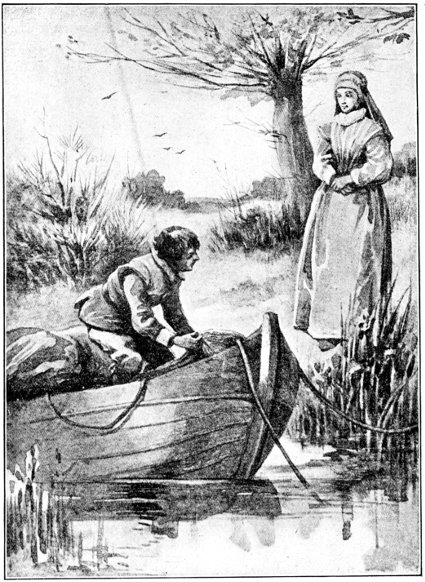
“And so you are off, Wynkin; well, the sooner the better perchance, for I believe there will be a storm before morning.”
If Wynkin had only known what he was carrying away from the Manor House along with his sacks and what-nots, as my lady called them, he might have whistled other sort of tunes than the jolly ones he indulged in as he punted on, on, till twilight darkened into night, and Charles, cooped up between the sacks, could no longer discern hedges from banks through the peephole he could keep open for himself only with difficulty.
All of a sudden, just as he heard the distant church clocks striking eight, a brilliant flash of lightning covered all he could see, followed by a crash of thunder, and then down upon the canvas covering pattered rain-drops as heavily as if they were crown pieces. For a short time the hurly-burly was so terrific that he almost, if not quite, wished himself back in the Cedar Room.
Just as the hurricane began to calm a little, Wynkin punted towards the bank, which was now fringed by a row of pollard willows, and he shouted to a man who was standing under them, “Is it you, Dickon lad?”
“Ay,” answered the man, as he lent a hand to the punt, while Wynkin jumped out of it. “A nice storm you be come in, brother Wynkin.”
“Yes,” laughed Wynkin, “but ’tis giving over a bit now. Have you got the cart?”
“Nay,” said Dickon; “old Dobbin’s so mortal afeard o’ lightning that I wouldn’t bring him out, and I’ve trundled down the garden wheel-barrer mysen, just to load with any small odds and ends you may have with you, and in the mornin’ we can come down and fetch the sacks, eh?”
“Right,” said Wynkin, “and here you are—catch,” and, stretching his arm under the canvas without removing it, he drew out the neatly packed baskets of good things which Lady Chauncy had sent{29} as presents to his parents. “Now then, help me to tow the punt up alongside under the trees, and then we’ll be starting, for I’m as wet through as a fish.”
Then in a few minutes they had the punt safely tied up to the willow-stems, and away they went chatting cheerily as they trundled the barrow over the bank into the wet road beyond. For the first time Charles ventured to stir, creeping out from among the sacks as quickly as his cramped limbs permitted, into the body of the punt. He was chilled to the bone, and very hungry, and thought longingly of that roast beef he had despised so much some hours before, and he almost wished he had not left his doublet behind him. Fortunately, however, in groping along, he tumbled right down over something soft. It turned out to be the crimson frieze cloak, which in the darkness and in the hurry must have dropped out of the basket. How beautifully soft and warm and dry it felt! And with a cry of delight, Charles wrapped himself round in it from his head to his little ice-cold feet, and then, as luck would have it, out fell a manchet of the white bread, which must have caught in among the folds of the cloak, and without more ado Charles took a deep bite into it as he sat down in the bottom of the punt, huddled up warmly in the cloak. “And then I must be on the march,” he said to himself, cheered a little by the warmth and the food, but before he had swallowed three mouthfuls, his eyelids drooped heavily, his weary limbs slackened, and he was fast asleep.
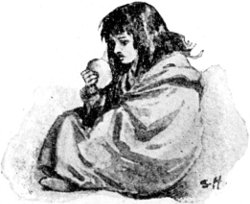
When he awoke, dawn was just breaking fair and rosy over the distant hills. He sprang to his feet in affright, quite unconscious for the moment where he was, but his wits soon came back to him, and he looked cautiously round across the still, shadowy, low-lying banks. He could now see that beyond the trees stretched a gorse-covered common,{30} and between, alongside the stream, wound a road.
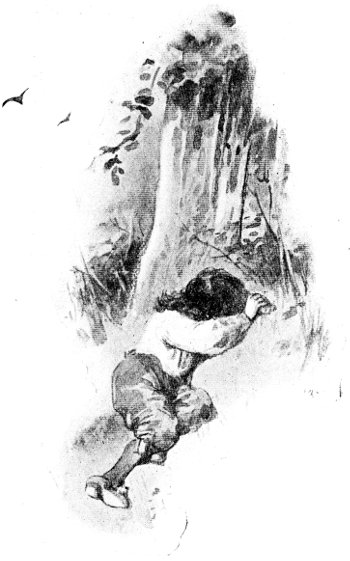
Drawing off the cloak, he placed it back under the canvas, though rather reluctantly, for the air was chilly. Then, having made short work of the morsel of the white bread he found in his fingers when he first opened his eyes, he mounted to the edge of the punt and sprang to the bank. Reaching the road, he walked on a little way, looking cautiously every step he took, but for a good mile he did not see a single human creature, though the birds were singing lustily and the bees and gnats were skimming and skipping in the sunshine, for the morning was lovely. But before long, however, the field and farm workers began to be about, and in spite of his best endeavors to dodge them by dropping in among the hedgerows and the gorse-clumps, he was forced to face some of them. They took little heed, however, of the little ragged boy, for ragged enough he was in his down-trodden and sodden shoes, and his fine white shirt and finest cloth gray breeches all gone to about the same mud color. With his dark locks and swarthy cheeks smudged with dirt and the juice of the blackberries he plucked and ate hungrily as he hastened on, the good folk, if they noticed him{31} at all, took him for some gipsy boy. But his heart was beginning to grow as heavy as his limbs, which were so weary that he could hardly put one bruised and bleeding foot before the other. All his merry adventure-loving thoughts were fading fast, and in their place rose up the terrible fear that when he reached London the King, instead of being rejoiced to see him, might be displeased. It was just possible, and the more tired he got, the more possible somehow it seemed, till at last he became terrified, for when his father was angry, his frown made the hearts of even grown-up great lords quake. All at once he fancied he heard voices calling, and overwhelmed with terror and fatigue, he had just strength enough left to hobble away into the wood which now ran along the roadside, till he seemed quite hidden, and, huddling together into the hollow of an old oak-tree, he sank down, sobbing bitterly.

“What is the matter, itty boy? Why are you kying so?”
And while the voice spoke soft and sweet as the coo of a dove, two little hands very gently, but firmly, clasped Charles’s hands, which were covering his face, and tried to draw them away.
He looked up, and, rubbing the blinding tears from his eyes, he beheld a little girl about six years old. She was a very chubby-cheeked tot of a thing, with short golden curls running over her head, and half covering her eyes, that were looking at him with immense curiosity.
“Are oo a blackamoor?” she asked, shrinking back a step as she saw his face.
“No,” said Charles, bursting into a merry laugh, “but I expect I have rather a dirty face.”
She nodded. “Blacker than oor hands even. But what was you kying for?”
“Well,” said Charles, “for one thing I—well, I’m dreadfully hungry. I believe I could eat a horse.”
“Do you?” said the child, with a glad light in her eyes as she opened a tiny satchel hanging on her plump arm, and taking from it a splendid prancing horse with a king crowned riding on his back, all made of gilt gingerbread. “I’s so glad—here’s a man on horseback from Banbury Fair—can you eat him too?”
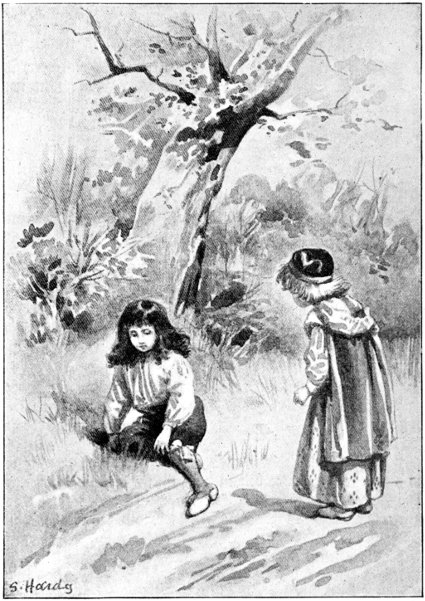
“Are oo a blackamoor?” she asked, shrinking back a step as she saw his face.
“Truly yes, and thank you, little maid,” laughed her new friend,{34} taking the gingerbread from her tiny fingers. “Why, ’tis the King! Long life to his Majesty!” he added, as he bit the man’s head off, and seemed to enjoy it heartily. “What is your name, dear?” he went on, with his mouth full.
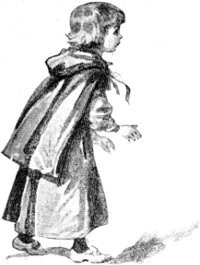
“What is oors?” said she, with a roguish twirl of her ripe red lips.
“Charles.”
“Ah, mine’s Molly—Molly Speedwell.”
“And whose little girl are you?”
“I’m the miller’s daughter of Oakside, and there’s my home,” she went on, pointing through the trees, and Charles discerned a red-roofed, white walled cottage standing in a garden. Hard by, upon a high turfy mound, was a mill, whose sails were whirling fast in the morning breeze. “And there’s the mill.”
“Oh,” said Charles, much disconcerted, “well, good-bye, little girl.”
“Don’t go,” pleaded the child, the tears brimming into her eyes.
“Needs must—I’ve got to be in London as quickly as I can. I’m going to see the King—” He stopped short and clapped his hand upon his mouth.
“Then you may as well save yourself the journey, youngster,” said a deep, manly voice behind him, with a laugh of amusement. “The King is hundreds of miles away from London. He started northward three days ago. And what, forsooth, can you be wanting of the King?”
Charles turned dumb with confusion to see before him a man white as a ghost from top to toe with flour. It was the miller, and taking up in his arms the little girl, who ran to him delightedly, he went on, “What can a gipsy boy like you be wanting of the King?”
“I am not a gipsy boy,” began Charles, “that is, I—I——”
“Always tell the truth,” said the miller. “Have you run away—from your camp?” he added, when Charles did not answer. “Where is the camp?”
“That’s just what I don’t know,” said Charles, who was thinking always of the soldiers’ camp, while the miller had, of course, the gipsies’ camp in his mind, as he looked at the little ragged boy, whose face somehow pleased him, in spite of its grimy state.
“I can’t find it, and—and—” and the tears broke forth afresh, “I don’t know what to do.”
And then Molly began to cry bitterly, “Poor itty boy,” she sobbed. “He’s dot no home, daddy.”
“H’m,” grunted the miller, “and a lazy loon anyhow he is, I’ll warrant.”
“No, faith, that I’m not,” contradicted Charles, with a flash of indignation in his eyes.
“Would you like to work, if you’d the chance?” said the miller, “at the mill here, for example?”
“Try me,” said Charles, looking longingly at the sails as they twirled, dazzling as silver in the sunshine. Of all things in the world, next to a colonel, he thought he would like to be a miller, and have to do with those sails and great, fat sacks. “Only try me.”
“Very well, I will for a week,” said the miller, “but, mind you, it isn’t play work. Come along. ’Tis a busy time, and I’ve no objections to an extra hand, if he’s a good, honest one.”
Molly clapped her two little hands with delight, and trotted off indoors to tell her mother all that had happened. And in an hour there was a marvelous sight, for the blackamoor boy was turned into such a whitymoor sort of a figure that there was certainly less chance than ever of anyone recognizing him for the little runaway Prince of Wales.
Meanwhile there was dire dismay at the Manor House when Lady Chauncy entered the Cedar Room and found it empty. She could not for a long time bring herself to believe her own eyes, and when at last she was compelled to do so, she wrung her hands and behaved almost like a frenzied creature. Both she and her husband had believed the room to be the securest place in the house, since the walls were of stone all round. That that one square of stone had been cut out behind the panel with goddess Minerva on it, nobody, in fact, had known for more than a hundred years, when the Lord of the Manor House of that time perished fighting for the White Rose, and the secret of the moving panel had perished with him. That the young Prince could have got out by the window was too terrible to think of. It seemed impossible, moreover, for the lattice was barred, leaving but quite narrow spaces between. Nevertheless, Lady Chauncy caused the moat to be dragged, but happily, of course, to no purpose.
It all seemed like some dreadful conjuring trick. Lady Chauncy did not know whether she was more glad or sorry that her husband had not returned. About a fortnight hence he was to be back, and the King with him, to fetch Charles away from the Manor House. Meanwhile she hesitated to send information to his Majesty of what had happened, because that would be spreading news which the Roundhead party against the King would take advantage of, and try to get the boy into their hands in order to drive a bargain with King Charles. Could it be they, she asked herself in her perplexity, who had spirited him away?
This was the terrible state of things Wynkin found when next afternoon he returned to the Manor. He was the more troubled by the thought that Lady Chauncy might imagine him to have been untrue to his trust after so many years of faithful service.
“But what do you advise, Wynkin?” said her ladyship, impatiently tapping the floor with the point of her silken slipper. “Do say something,” she added, as Wynkin maintained a thoughtful silence.
“Well, then, speaking what I think,” replied Wynkin, “it is that I would advise your ladyship to get a good night’s rest.”
“Rest, forsooth. What next?”
“It is too late to be doing anything to-day.”
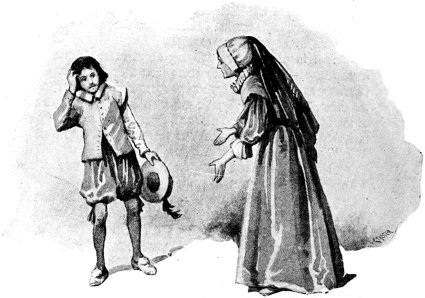
“And meanwhile?” cried Lady Chauncy despairingly.
“Meanwhile,” said Wynkin, “there is a good Providence over us all.”
“Perhaps you are right,” said Lady Chauncy, as she rose and went to her sleeping-chamber, but not to sleep.
When, however, the last light was out in the windows of the{38} Manor House Wynkin let himself out by a little postern of the garden wall, and strolled onward by way of the bit of waste ground till he reached the edge of the thicket, walking to and fro under the trees by the dim light of the moon, cogitating deeply over a curious circumstance which he had decided not to inform his mistress of in too great haste, lest her hopes might be raised to no purpose. The one very certain fact was that when he and Dickon came that morning about six o’clock to unload the punt of the sacks, he had found the crimson frieze cloak on the top of them, all crumpled and mud soiled, and touched here and there with marks like tiny finger-marks. In some dim fashion it made Wynkin fancy that he began to see daylight. At all events, he suddenly saw the light of a lantern dodging about before him among the furze clumps—and as already more than a day had gone by since Charles was missing, and such news spreads like wildfire in spite of the utmost precaution, Wynkin was considerably disturbed at sight of the light, which glanced now and again on the figure of a person in a broad slouch-brimmed hat and shrouded in a long black cloak.
“Hullo!” he called, “who goes there?”
“Nobody,” replied a disagreeable squeaky sort of man’s voice. “Anyway, ’tis no concern of yours.”
“We’ll soon settle that question, Master Jack o’ Lantern,” said Wynkin, bounding down over the hillocks towards the figure. Not, however, before the man, dropping the lantern right into the middle of the gorse clump he was hovering over, was pelting off as quick as his heavy cloak would let him.

In a minute Wynkin would have laid him by the heels, but suddenly up rose a tremendous flare, for the lantern had fallen open as it dropped and the light had caught the gorse, and the strange part of it all was that, as the bush broke into one huge flame, it fell disappearing into the ground, as if there was a deep hole beneath. Looking down, that was precisely what Wynkin beheld, a deep hole, bricked round, and in one side a half-open grated door.
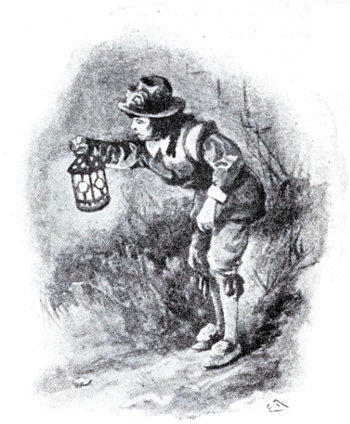
Looking regretfully enough after the fast-disappearing figure of Master Jack o’ Lantern, Wynkin caught up the lantern and, setting it straight, he jumped into the hole, where the bush was already smouldering to nothing. He peered through the open grating, and the next moment he passed in. “Where are we, I wonder?” he said to himself, “and—hullo! what’s this?” he went on, as he nearly set foot on something that glittered in the lantern gleam, bright as a star.
It was a blue ribbon rosette, tied with silver cord, of the exact pattern of the rosettes the little Prince was wearing on his shoes. It was all sodden and soiled now with the mud it lay in, and{40} Wynkin picked it up as carefully as if it had been some little wounded bird, and placed it inside his vest next his heart, which beat fast with eager expectation. Then he hastened on, looking right and left all the way he went, threading the windings of the narrow passage, and up the twisting staircases, till at last he could go no farther because the wooden panel barred his progress. “Oh, ho!” again said he to himself, as he set his shoulder against the wood and pushed it with so much more force than it required that it flapped round before he could right himself, and he fell sprawling, lantern and all, along the floor.
“By my faith!” he said, as he picked himself and the lantern up, and stood looking round while he rubbed his shoulder, “it is the Cedar Room!”
And then more clearly than ever Wynkin began to see daylight, but all the same his face was very grave and anxious, for he was vexed with himself that he had not first given chase to Master Jack o’ Lantern, as he called him. “For what could he be wanting skulking round the place like that for? Ill news flies apace, and I doubt not the malcontents are aware already of the child’s escape. Well,” he added more cheerfully,
but for all the flare he made, he warn’t very warm, I fancy. The boy is not in hiding hereabouts, if that red cloak means anything.”
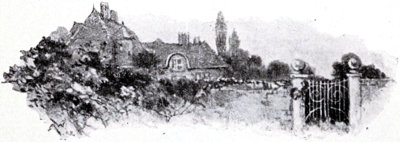
Ordinarily speaking, there is of course rarely much difficulty in tracking little truant boys or even girls. Prince Charles was not, however, a mere ordinary little boy. He was the King’s son, and the people, who were beginning to think of fighting against King Charles on account of displeasure with some of his ways of governing, would have been very glad to get the child into their power. They thought they would be able to make a better bargain with the King, who would agree sooner to what they demanded out of fear that, if he did not do so, they might harm the little boy. There were good and just Roundheads, as those discontented persons were called, who would not have lent their aid or approval to such miserable and mean ways of settling matters,{42} and among the many of them was the miller of Oakside. He was a strict Roundhead, and if the quarrel came to a fight, he was quite determined that he would, if it was necessary, lay down his life for what he considered the right and good cause, against the King. Still he prayed and trusted that there would not be war in the kingdom, and the sorry sight of Englishmen fighting with Englishmen. It seemed too fearful, and he now went about his work with a very grave face, though, in a general way, he was neither sad nor sour-natured, but a brave, industrious, honest, cheery man.
When Wynkin was admitted next morning to Lady Chauncy’s little sitting-room, he at once informed her of the past night’s adventures. She was very much astonished at his discovery in the Cedar Room. “’Tis certain,” she said, with almost a smile on her troubled face, “that, as my husband so often hath said, ‘A fortress is not stronger than its weakest part,’ which in this case appears, from what you tell me, Wynkin, to be Minerva’s nose. But who’d have thought it? and if your guess is correct about the red cloak, as I am persuaded it is, that is the direction in which this most naughty boy hath gone.”
And ere many days passed, Wynkin’s guesses became certainties, for, after all, Oakside was only a very few miles from the village in which his father and mother lived, for all Charles fancied he had walked an immense long way that morning before he sat down and sobbed under the oak-tree. Had the matter been merely one of coming to Oakside, and fetching him away, the little runaway would soon have been back again at the Manor, but it was not. There were now spies, and a number of other evil-minded persons, loitering for many miles round, ready to attack any of the Royalist folk, as the King’s party were called, who should attempt to carry him away from Oakside. While he was under the miller’s roof or in his care, they did not dare to touch him, as the Miller himself was a powerful Roundhead, and one who was much trusted and very wise in his way.
Meanwhile, the miller’s boy turned out a capital boy for such a small one. He was most diligent, rising with the lark,{43} and so obliging and obedient, and, though sad sometimes, he was generally merry, singing at his work, and when the millwork was done, he would fetch in water from the well for Mistress Speedwell, and logs from the out-house for the great kitchen hearth-place, for the evenings were beginning to grow chilly, and he played cat’s cradle and spillikins with Molly, and cut out little men and women and cows and dogs from paper, to her boundless delight, and the miller, for all he was so silent, and even grim in his manner to him, was forced to yield him a good word when Mistress Speedwell would ask her husband if he did not consider that the shelter they had given the poor forlorn gipsy lad had returned as a blessing on themselves, for Mistress Speedwell did not know the truth, whatever her husband might know, or whatever he might suspect.
The only fault Mistress Speedwell had to find with him was that, though he kept himself very neat and spruce in the linen jacket and breeches she made for him, he never could be persuaded to wash the flour off his face. The reason he gave for this was that millers were always white. It was the proper thing for them to be so.
One evening she grew really angry about this, “Do you hear?” she said, “I insist on you washing your face. When you came, it was as black as a tinker’s, and then you had not been here a couple of hours before you got it all over flour. If you do not do as I bid you, I will take you and souse your head in the pail myself.”
“Please——” began the boy.
“Ah, please me no please,” she cried, turning to her husband; “will you not have the urchin obey me?”
“You hear what you are bidden to do,” said the miller to the boy, but he spoke rather unwillingly. And Charles crept off, daring no longer to disobey.
“Ah, now,” said Mistress Speedwell, when he returned with his brown cheeks shining like a warming-pan with the rubbing she had bidden him not to be sparing of, and a deep flush from brow to chin, “now we can look truth in the face,” and she was satisfied, and settled quietly to her wheel; and Molly, who had been sorely{44} disheartened to hear her playmate scolded, smiled delightedly. She thought it was the nicest boy’s face she had ever seen; but the miller looked graver than ever, and only said “Umph!” as he glanced over some letters he had received that day, and then sat gazing in a very troubled manner into the fire.
The next evening soon after dark a solemn-looking, plainly-attired gentleman rode up to the gate of the cottage and asked to see Master John Speedwell. He was shown into the best room, where he kept the miller talking for more than an hour, but the interview did not appear to have been very satisfactory to the visitor, who said to Speedwell, as he went away, “I trust that you will come to see the error of your resolve. And,” he went on, when the miller made no reply, “seeing that you are not rich——”
“No, I am a poor man,” said the miller, “but I hope always to remain an honorable man, and I will give up the boy for no money price.”
“Not even in the good cause?” scowled the stranger.
“The cause would be no longer good were I to do this that you seek of me. So fare you well, sir, for by my honor, which I have always kept bright and fair, I will deliver the boy only into the hands to whom he belongs.”
“Well,” said the stranger, in deeply-angered tones, “you know what to expect—I have warned you.”
“And though my house be stormed, and you should be able to kidnap the boy—which I much doubt you shall succeed in doing—I abide by what I have said,” replied the miller.
And so the stranger mounted his horse again, muttering and grumbling till he was gone out of sight.
Then the miller returned to the kitchen, and sat down by the fire alone. The rest of the little household were all abed. He listened intently. For a long time there was no sound but the brisk night wind stirring round the house, but as the village church-clock struck eleven, there came a low tap on the lattice. The miller rose, and, drawing aside the curtain, said in a low tone as he opened the lattice, “Are you ready?”
“Ay, ready,” replied the person who tapped, dropping the folds of the big cloak he was wearing from about his face, which was Wynkin’s.
“’Tis well you are come to-night,” said the miller, “for my house is threatened. They might even storm it to-morrow and steal the Prince, for all my endeavor.”
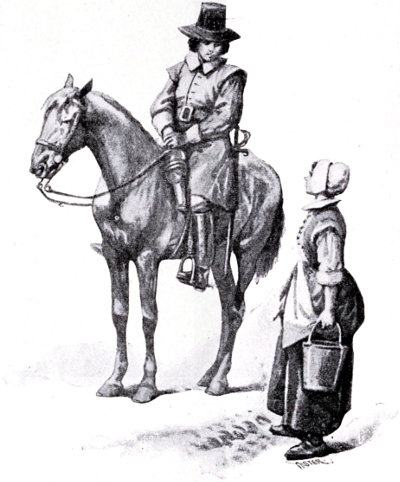
“I dared not venture till to-night,” said Wynkin, “but I know that this evening the coast is clear. They are all gone upon another scent.”
“Come with me,” said the miller, and he led the way above stairs. “Have you a horse?”
“Nay,” smiled Wynkin, “I have the punt; which is safer, since it is less suspected, and it is freighted with half a dozen stout men-at-arms under the canvas.”
“Take your treasure,” said the miller, as he unlocked a door, and motioned Wynkin to approach the bed where the miller’s boy lay sleeping soundly after his day’s fetching and carrying, “if indeed, as I believe, it belong to your master.”
“Ay, truly it is our lost one,” murmured Wynkin, as he lifted the sleeping child so gently in his arms that he did not stir, but seemed only to breathe the more restfully as the trusty serving-man wrapped his cloak close round him so that he could not be seen. “Heaven reward you, Master Speedwell,” and, turning down the stairway he sped out by the door, never stopping till he reached the punt held fast alongside by many hands that stretched from under the canvas covering. Then as the word was given, away, fast, on and on glided the punt, and sleeping the restful sleep of a tired child, the little Prince never stirred till far on towards morning just before the breaking of the dawn, by which time he lay in his own little carved bed in the Cedar Room shaded by its silken curtains, and then Charles was too drowsy to understand much.
“Is that you, Wynkin?” he murmured, as at the sound of his voice the serving-man came beside him, while Lady Chauncy and Sir William, and a tall, dignified gentleman, who was the King, and had but that night arrived at the Manor, drew back, lest they might startle the boy. “Is it you, Wynkin, dear?”
“Yes, your Highness.”
“Ah! you don’t know what mighty strange dreams I’ve been dreaming. All about windmills, and little tots of girls, and then, oh, Wynkin, a terrible dark hole—so dark——”
“Think of that now!” interrupted Wynkin. “Well, if I were you I’d wait and tell it all to-morrow.”
“Yes, and then I heard my father’s voice. I wish that wasn’t all a dream, I can tell you.”
“Well, I expect that will be coming true before many days—perhaps many hours—are over. But, go to sleep again now, won’t you?”
“Yes. Is this the Cedar Room?”
“Certainly. You like the Cedar Room, don’t you?”
“Oh, yes. ’Tis well enough, but I don’t like the door of it to be locked.”
“Oh, well, then we must talk to Lady Chauncy about it to-morrow,” said Wynkin, as he stole a sly glance at her ladyship, who smiled in her white prim frame of a cap. “It is a grave question, and will have to be considered.”
“No, it will not,” said the Prince of Wales. “’Tis proper for my wishes to be obeyed.”
“Well, if you promise not to run away, perhaps——”
“Run away—I do not want to run away. I——”
“You’d promise you wouldn’t?”
“Certainly.”
“On your honor?”
“Honor bright,” murmured Charles as he fell asleep again.
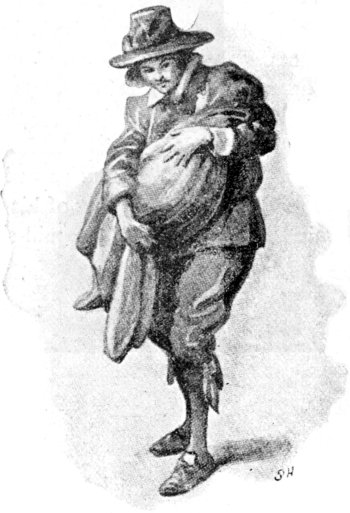
It is hardly necessary to say that Charles kept his word. The favor he desired was granted him after he had been summoned next day to the presence of the King and of Sir William and Lady Chauncy in the dining-hall. Each of them in turn pointed out to him not only the terrible danger he had exposed himself to by running away out into the wide world, but also the misery and strife that had nearly come of it for everybody—not by any means{48} least or last for good Master and Mistress Speedwell and the sweet little maid Molly, who had been so kind and pitying of his plight.
After that Charles was permitted to leave the great shadowy hall, and since the King and Sir William considered that he must have suffered enough, and had shown himself brave as boys should be under difficulties and privations, no more was said about the matter by the King or by Sir William. Lady Chauncy, however, never wearied for a long time of lamenting that she could not “give him a good whipping as he deserved,” she said, “as much as any other naughty little boy,” and to escape that was one of the very few advantages Charles found in being the King’s eldest son, upon whom at that time it was not accounted lawful to lay whipping materials of any kind.
Till a short time after, when his father took him to London with him, Charles had his freedom in the old house as far as his given word allowed it him. As to Wynkin, he remained Charles’s most trusty and well-beloved friend to the end of his long life.
Molly grew up to be a brave yeoman’s wife, and of winter nights as she sat at her wheel and little, merry-faced, golden-haired, blue-eyed children, like once she herself had been, were gathered round her, she would relate the story of the gipsy boy who was now King of England. As for the miller, he lived long and peacefully, not mixing so much as of old in the affairs of the nation, but attending to the grinding of his corn, and listening with a contented mind to the music of the mill-sails, as they whirled in the wind.
[Transcriber’s note—the following changes have been made to this text:
Page 23—it to if—“even if he dared”.]